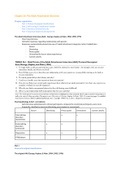Chapter 26: The Adult Attachment Interview
Chapter organization
- Part 1: Protocol & original classifications
- Part 2: AAI scoring & classification system
- Part 3: Earned or Evolved Security
- Part 4: Empirical Studies Involving the AA
The Adult Attachment Interview (AAI) - George, Kaplan, & Main, 1984, 1985, 1996
- Hour long interview
- Verbatim responses regarding relationships with parents
- Responses systematically placed into one of 3 adult attachment categories, latter 2 added later::
- Secure
- Dismissing
- Preoccupied
- Unresolved for loss or abuse experiences
- Cannot classify
Psychopathology & AAI - correlations
- AAI interviews administered to clinical participants, compared to nonclinical participants, were more
frequently classified as insecure (dismissing, preoccupied, or unresolved)
Secure Dismissing Preoccupied Unresolved Cannot classify
Internalizing x x
disorders
(borderline)
Externalizing x x
disorders
(antisocial)
Depression x x
PTSD/abuse x
_______________________________________________________________________________________________________________________________
Part I
Protocol & original classifications
The original AAI (George, Kaplan, & Main, 1984, 1985, 1996)
, - 1 hour, 20 questions
- Transcribed verbatim, including pauses, disfluencies, restarts
- Non-verbal behaviour, intonation, prosody omitted
- Moves at a rapid pace so all questions can be asked within 1 hour
AAI categories
- grounded in the relation between the three central or organized forms of parental responses to the AAI
queries:
- Secure-autonomous
- Insecure-dismissing
- Insecure-preoccupied)
- As well as three central or organized forms of infant response to that same parent in the Strange Situation:
- Secure
- Avoidant
- Ambivalent/resistant
Organized categories in terms of flexibility
- Strange situation (Main, 1990)
- Flexibility → Ascribed to secure babies (alternate between attachment and exploration)
- Inflexibility → Ascribed to avoidant and resistant/ambivalent infants
- AAI (Main, 1993)
- Flexibility → secure-autonomous
- Inflexibility → dismissing/preoccupied
Organized categories in terms of Grice’s Maxims (1975, 1989)
- “Gricean” requirements for an ideally rational, coherent, and cooperative conversation
- 4 specific maxims/principles:
- Quality → be truthful, have evidence for what you say (no bias!)
- Violated → highly favorable, general terms to describe parent
- Quantity → be succinct, and yet complete (not too long/short)
- Violated → when, for example, “I don’t remember” becomes the response to several
query
- Relation → be relevant to the topic as presented
- Violated → queries regarding the childhood relationship with the speaker’s mother are
irrelevantly addressed
- Manner → be clear and orderly
- Violated → speaker does not finish sentences, psychological jargon is used
Classifying examples according to Grice’s maxims
- Secure autonomous → speaker keeps quality providing evidence for loving, no real violations of
manner
- Dismissing speakers → violate Grice’s quality maxim by failing to provide evidence for what they
have claimed. The responses are frequently also excessively succinct (quantity).
- Preoccupied → unable to stay within the question frame (quantity), violation of relation, unclear
(manner violated)
_______________________________________________________________________________________________________________________________
Part II
The AAI Scoring and Classification System
Original 3 categories
- Early classifications were based on interviews with parents (both mothers and fathers) who were visiting
Main’s Social Development Project laboratory at the University of California at Berkeley, with their 6 year
olds
- Most notable characteristics of each transcript were recorded





